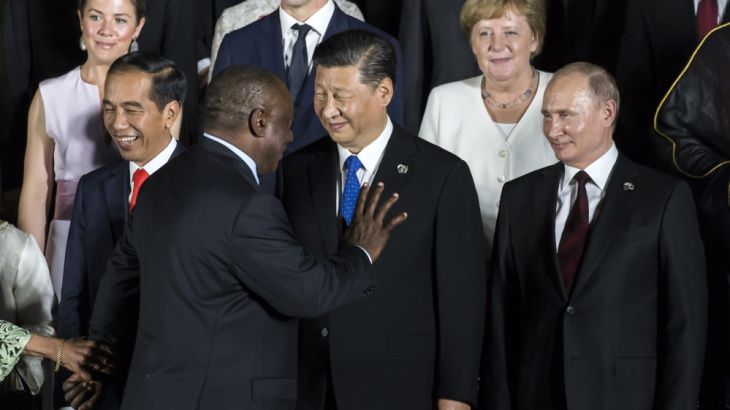
What’s driving Russia’s interest in Africa?
We look at rising Russia-Africa trade, the economics behind the S-400 deal, and new players in the gaming industry.
As the Soviet Union imploded, it turned its back on the African continent in the 1990s. But now, under President Vladimir Putin, Russia is once again making a push to engage.
Some of the reasons: Western sanctions against Russia; its pivot to China which has not been a success; hopes for billions of dollars in Middle East investment which have not arrived in the quantities expected; and the value of African votes at the United Nations.
Keep reading
list of 4 itemsEcuador weighs security, international arbitration in latest referendum
‘Triple spending’: Zimbabweans bear cost of changing to new ZiG currency
Boeing hit with 32 whistleblower claims, as dead worker’s case reviewed
So what is Russia doing in Africa? Some of it includes oil and gas deals with Algeria, Egypt, Ghana, Nigeria and Mozambique; nuclear deals with Rwanda and Zambia; and big supplies of arms to countries including Egypt, Sudan and Angola.
Russian trade with Africa rose 26 percent to $17.4bn in 2017.
“I think it’s about finding every export opportunity that [Russia] can,” says Charles Robertson, the global chief economist at the Russian investment bank RENCAP. He says the relationship includes political and military aspects, with one in seven of all Russian exports to Africa being arms-related.
“If you take the first 5-10 years of Putin’s rule in Russia, [there was] very little focus on Africa, very little interest,” he says. “What seems to have shifted is with the sanctions getting imposed by the US and the EU in 2014-15, we then see Russia decide that it needs to build links around the world – to China, India, the Gulf … and now to Africa too.”
“I think the West is much more concerned with China at the moment and their engagement [in Africa],” he adds. “They are only beginning to pay attention to what Russia might be doing.”
Turkey: Between Russia’s deal and US sanctions
The prospect of further US sanctions on Turkey over its decision to buy Russia’s S-400 missile technology has been delayed for now. President Donald Trump blamed the impasse on the Obama administration, saying Turkey had been treated unfairly by not being allowed to buy US Patriot missiles.
However, others in the US administration said sanctions would go ahead if Turkey took delivery of the S-400.
“The different pillars of the US administration, and also Congress, are intent on imposing those sanctions,” says Sinan Ulgen, the chairman of Istanbul-based Centre for Economics and Foreign Policy Studies.
“It remains to be seen to what extent Trump can actually deliver on his promise made to the Turkish president … to actually prevent or block these potential sanctions.”
If sanctions do go ahead, it could destabilise the Turkish economy. It would raise Turkey’s risk perception, and also have implications for the country’s defence industry, Ulgen says.
“It will also have an impact on the F-35 programme whereby the US has clearly stated if the S-400 come to Turkey, the US would stop the delivery of the F-35 aircraft to Turkey but also exclude Turkish defence companies from the production line of the F-35. So there are many different aspects of possible impact.”
Meanwhile, the first shipment of the Russian S-400 missile system has arrived in Turkey, according to a statement by the Turkish defence ministry on July 12, moving the NATO member closer to a new standoff with the US.
Can Google and Apple change the gaming industry?
It is estimated that more than 2.5 billion people play computer games every year, with e-sports getting an audience of 458 million a year.
By 2025, the video game industry – currently dominated by Xbox, PlayStation and Nintendo – is expected to be worth some $300bn. And that is why some of tech’s biggest players are introducing rival services. Google’s parent company Alphabet will launch Stadia, and Apple will introduce Arcade this year.
“They already have revolutionised the games industry once,” Vili Lehdonvirta, from the Oxford Internet Institute, says about the tech giants.
“Apple App Store and Google Play store popularised mobile gaming and the micro-transaction and advertising revenue models for games.”
He says Arcade appears to be more complementary to Apple’s existing offerings, whereas Stadia seems to be “a much more ambitious effort”.
“They are trying to envelop the existing platforms and become a platform of their own,” he says.
Lehdonvirta says although Stadia is by no means the first cloud-based gaming service, it is the one that is hoping to largely eliminate the time-lag that restricts other similar services. “It remains to be seen whether they can solve that problem.”